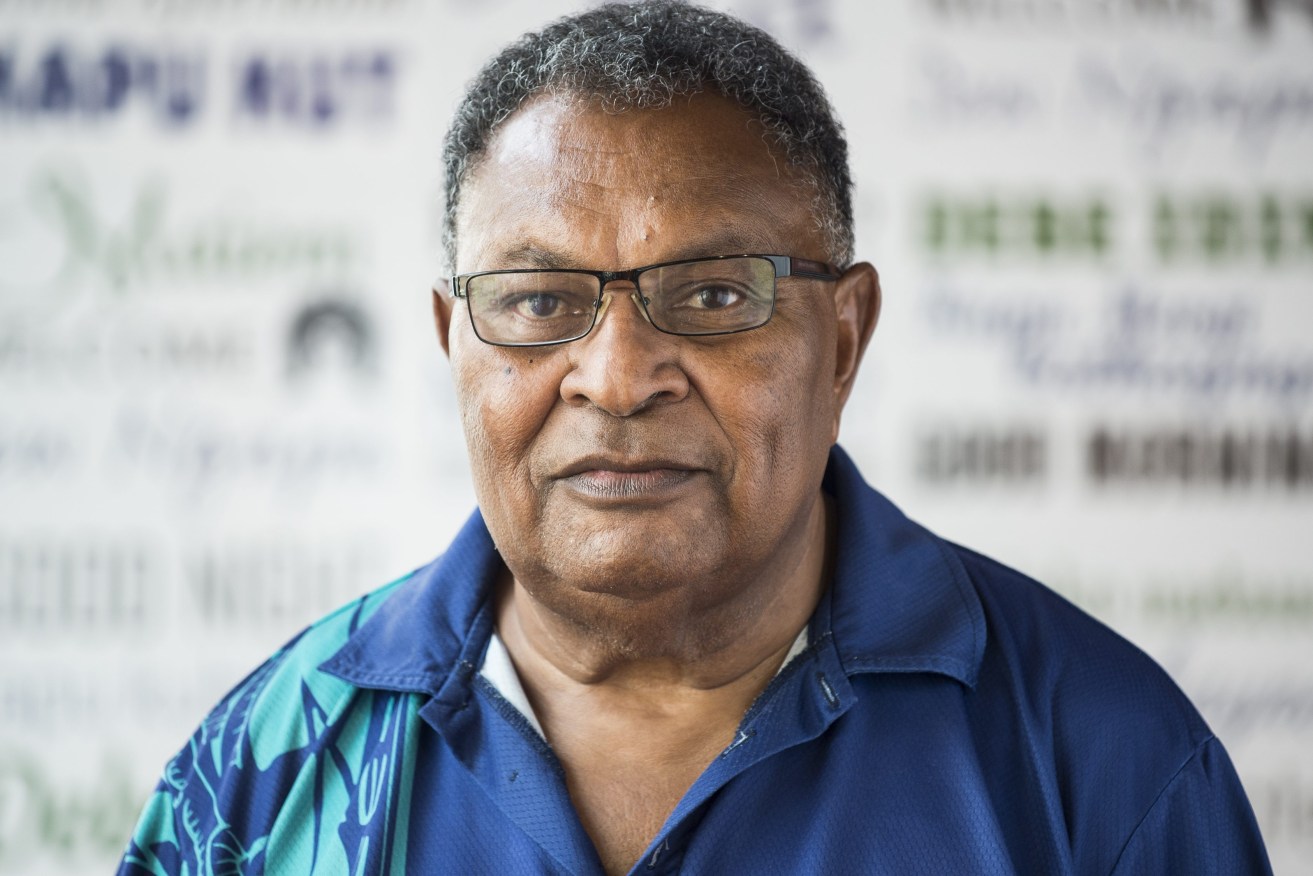‘Raping our reef’: Torres Strait alarm over foreign fishing ‘invasion’
Torres Strait Islanders say foreign fishing vessels are plundering their waters in unprecedented numbers, further threatening their traditional way of life.

Torres Strait Regional Authority Chair Napau Pedro Stephen said local fishermen couldn't compete against the factory vessels. (AAP Image/Aaron Bunch)
Australia’s fisheries authority is also alarmed by the border intrusions and is working to ramp up surveillance.
Traditional owners claim more than 50 Chinese-sponsored Papua New Guinean fishing boats have been intensively and illegally working the Warrior Reefs in the archipelago’s northeast.
“They’re taking anything and everything off that reef: clams, turtles, octopus, small, big, anything, and they’ve been doing it since December,” Iama Fisheries Management Authority spokesman Charles David told AAP.
“Some nights on that reef it’s like a city with all the lights. These people don’t muck around. They’ve got nothing to lose and they are raping our reef.”
David, a veteran fisherman, said the boats usually have about five crew and primarily target valuable tropical rock lobster and sea cucumbers on the 80km reef for commercial export to China.
“One night there were 80, six to eight-metre, boats out there on that reef,” he said.
“They’re harvesting endangered species too, including dugong, and they take up to 800kg of product per boat.”

Thursday Island town foreshore from Victoria Parade, in the Torres Strait. (AAP Image/Aaron Bunch)
David believes the foreigners moved in after Australian Border Force vessels, which patrolled the maritime border in northern Queensland when migration was stopped during the Covid-19 pandemic, left the region in late 2022.
“They are even camping on Warrior Island. That’s how cocky they’ve become and how lax the border force has been lately,” he said.
Under the Torres Strait Treaty, PNG fishermen from 13 villages north of the archipelago can enter the protected zone in Australian territory for traditional fishing to feed themselves and their families.
They are also permitted to hunt dugong and turtle and take lobster but must abide by catch limits and comply with local community management plans.
The Department of Foreign Affairs and Trade says the treaty protects traditional owners and their way of life.
It also provided the framework for commercial fishing laws in the region in a bid to develop the industry for both countries and preserve the marine environment.
Under the Torres Strait Fisheries Act, commercial fishermen from PNG are also permitted to fish for tropical rock lobster. A quarter of Australia’s 85 per cent share of the 521-tonne annual catch limit is allotted to them.
There is no catch-sharing agreement in place for Spanish mackerel, prawn, pearl shell, finfish, sea cucumber, trochus snail or crab.
The treaty was suspended in early 2020 when Australia’s international borders closed amid Covid, reducing the number of arrivals from PNG down from 15,000 in 2019 to 253 in 2021.
The suspension was lifted and normal travel resumed in late October.
David said the foreigners were putting at risk the livelihood of Indigenous fishermen, who primarily used dinghies and caught 40kg to 50kg of crayfish or fish.
“We’re already on the breadline up here with the annual catch limits,” he said.
“We don’t have the employment or education opportunities they have down south, our economy is the fisheries.”
He said local fishermen should be financially compensated for the federal government’s alleged failure to adequately protect the Torres Strait fisheries.
He also called for traditional owners to be employed to help patrol the waters and enforce compliance, adding the authorities needed to do more to prevent illegal fishing.
The Australian Fisheries Management Authority, the government agency responsible for overseeing fisheries, said illegal fishing was a threat to the resource’s sustainability and the agency’s ability to manage it.
“Just as importantly it threatens traditional livelihoods and ways of life,” chief executive Wez Norris said.
“We take it very seriously.”
Norris said foreign fishers were also coming from Indonesia and the number of vessels from both countries was increasing.
He also said the treaty made enforcing Australian laws and regulations a tough job because some PNG fishermen had a right to be in the waters.
“It’s a very complex space the compliance officers operate in and we are looking to step up our presence,” he said.
Norris said the authority was negotiating with the Queensland government to undertake joint patrols in state-owned vessels.
“More importantly we’ve been talking very closely with the PNG national fisheries about opportunities for joint patrolling,” he said.
The authority has also sought permission to undertake community education visits to PNG villages.
The Strait is protected by the Australian Border Force and the Australian Defence Force in consultation with the authority.
The task force, named Maritime Border Command, says it works to prevent illegal fishing and safeguard Australia’s fish stocks against exploitation by unregulated foreign fishing vessels
In a statement, the border force said it responded to reports of foreign fishing vessels operating illegally in Australian waters, including in the Torres Strait.
“The ABF has a range of capabilities to detect, deter, and disrupt any unlawful activity in Australia’s maritime environment,” a spokeswoman said.
The claims about the foreign vessels come amid ongoing frustration over laws and regulations that allegedly prevent Torres Strait Islander fishers from easily working in waters outside their region but permit large commercial mainland boats to fish the archipelago.
Napau Pedro Stephen, Torres Strait Regional Authority chair, said local fishermen couldn’t compete against the factory vessels.
“We own most of the fisheries licences but the bigger boats can come in and fish our waters,” he said.
“Our dinghies have to go out and back and pay for fuel while the motherships sit out there and get all the crays.”
He said the legislation should be reviewed to allow Torres Strait Islander fishers to more easily access southern waters.
“When the Torres Strait Fisheries Act was created it said Torres Strait Islanders can only commercially fish the Torres Strait waters, yet our forefathers actually fished right down to southern Queensland.”
The Torres Strait fisheries are managed by the Commonwealth and Queensland government, with consultation from traditional owners, through a joint entity known as the Protected Zone Joint Authority.
The Queensland government controls the waters to the south and says traditional owners can buy or lease commercial fishing licences and catch quotas if they want to work in them.
It also has a development program to help Indigenous communities trial and start commercial fishing operations.
The Torres Strait regional authority wants the archipelago’s Indigenous communities to own all the commercial fisheries to bolster the region’s economic benefit from the resource and “close the gap”.
A 2013 High Court sea claim decision legally recognised the historic and cultural significance of marine resources to Torres Strait Islanders.
It also found they have a native title right to take fish and other marine resources for any purpose, including commercial.
The regional authority has recently helped start Zenadth Kes Fisheries, which is a community-owned seafood distribution company that hopes to develop export markets.
It has also previously raised concerns about suspected high-level illegal fishing in the region.
David said Torres Strait traditional owners follow a sustainable fishing model, but the mainland commercial fishing vessels took as much as they could and the quota system was set up to enable it.
Management policies were disrespectful to Torres Strait Islander culture and spiritual connection to the sea country, he added.
“We have always engaged in good faith, yet our concerns and suggestions for solutions have been falling on deaf ears.”
Fisherman Thomas Fujii agreed, saying “greedy” mainland commercial fishermen were increasingly ignoring traditional protocols and fishing earlier in the season to meet Chinese New Year demand.
“The quota is worth millions of dollars and they have the right to fish and they can tell us to get stuffed and they do,” he said.
“In the treaty, it says we are protected but now by them having the quota it’s open slather for them.”
Fujii said Torres Strait Islanders were getting economically squeezed out by the southern operators and the Chinese-backed PNG fishing boats.
“They’re putting in better boats for the New Guinea fellas and they can fish everywhere in the Torres Strait,” he said of the Chinese.
David said a new model that enabled Torres Strait Indigenous fishermen to also economically benefit from the resource was urgently needed.
“We are paying $3.70 per litre (for fuel) travelling 10 nautical miles to the fishing grounds every day, but the southern boats are already there and it means it can be tough to make a profitable catch,” he said.
He said of the 500 commercial fishing licences issued to Torres Strait Islanders, only about 200 people were working full time and less than 100 were making a reasonable living.
According to the Australian fisheries authority, traditional inhabitant boat licence holders were allotted two-thirds of the country’s 75 per cent portion of the tropical rock lobster catch quota in the Torres Strait for 2022-23, with commercial fishers, often from outside the region, allocated the remaining third.
Management plans are in place for the Torres Strait Islands’ other fisheries and access is almost exclusively allocated to traditional owners, with the exception of the region’s endeavour, tiger and king prawn fishery.
Norris said the allocation agreements were a success story that had the potential to create jobs and reverse the historic trend that saw non-Indigenous fishers take about 80 per cent of the annual catch limits.
However, he was careful to point out that the region’s remoteness made it tough for traditional owner fishermen to make the most of the commercial opportunity.
-This AAP article was made possible by support from the Meta Australian News Fund and The Walkley Foundation.












